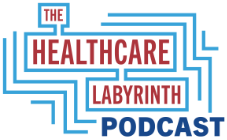Quiet Discussions On Capitol Hill On An Enhanced Subsidy Extension
About The Podcast:
Millions of Americans feel confused and frustrated in their search for quality healthcare coverage.
Between out-of-control costs, countless inefficiencies, a lack of affordable universal access, and little focus on wellness and prevention, the system is clearly in dire need of change.
Hosted by healthcare policy and technology expert Marc S. Ryan, the Healthcare Labyrinth Podcast offers accessible, incisive deep dives on the most pressing issues and events in American healthcare.
Marc seeks to help Americans become wiser consumers and navigate the healthcare maze with more confidence and certainty through The Healthcare Labyrinth website and his book of the same name.
Marc is an unconventional Republican who believes that affordable universal access is a wise and prudent investment. He recommends common-sense solutions to reform American healthcare.
Tune in every week as Marc examines the latest developments in the space, offering analysis, insights, and predictions on the changing state of healthcare in America.
About The Episode:
On this episode, Marc discusses the quiet talks on Capitol Hill on an enhanced subsidy extension.
Key Takeaways:
Quiet talks are occurring on Capitol Hill on the status of the enhanced Exchange subsidies.
During the COVID pandemic, the base premium subsidies were enhanced and will expire at the end of this year.
The enhanced subsidies significantly reduced expected premiums against the permanent law, especially at lower incomes.
At the same time, it removed the 400% poverty level cap on subsidies.
Negotiations are ongoing between the White House and moderate Republicans and Democrats in Congress.
While most Republicans oppose any extension, GOP leaders may have to bow to moderates’ and swing district holders’ demands. Democrats say they will not vote to reopen government unless the subsidy issue is addressed.
Without an extension, consumers would see an average increase of 114% from an average of $888 in 2025 to $1,904 in 2026. Millions could lose coverage due to affordability issues.
Individuals making $18,000 would pay $378 more a year, with individuals making $55,000 paying $1,469 more a year.
A family of four making $40,000 would pay $840 more a year, with a family of four making $110,000 paying $3,201 more.
Older, middle- to high-income adults are expected to face the largest dollar increases in premiums. Hikes will also vary by markets in each state.
On the table to get to a compromise are a short-term extension, an income cap on subsidies, minimum premiums for everyone, and allowing the enhancements only for existing enrollees.
Connect With Marc:
Resources:
The Healthcare Labyrinth: A Guide to Navigating Health Plans and Fixing American Health Insurance





